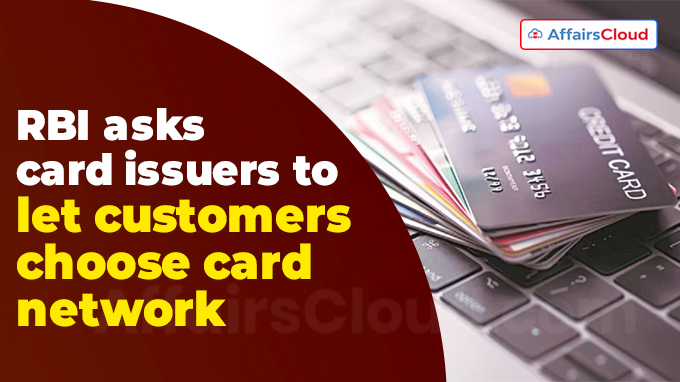 The Reserve Bank of India (RBI) in exercise of the powers conferred by Section 35A of the Banking Regulation (BR) Act, 1949 and Chapter IIIB of the RBI Act 1934, amended the ‘Master Direction – Credit Card and Debit Card – Issuance and Conduct Directions, 2022’, the provisions of which will come into effect from March 07, 2024.
The Reserve Bank of India (RBI) in exercise of the powers conferred by Section 35A of the Banking Regulation (BR) Act, 1949 and Chapter IIIB of the RBI Act 1934, amended the ‘Master Direction – Credit Card and Debit Card – Issuance and Conduct Directions, 2022’, the provisions of which will come into effect from March 07, 2024.
- As per it, card issuers are barred to enter into any arrangement with card networks for the issuance of credit cards that restrain them from availing the services of other card networks.
- This will benefit as customers as they will get the freedom to choose from multiple card networks.
- The timeline to follow the new norms by the card issuers is 6 months.
Applicability:
i.Instructions relating to credit cards will be applied to all credit card issuing Banks and Non-Banking Financial Companies (NBFCs).
ii.Instructions related to debit cards will be applied to every bank operating in India.
iii.These will not be applicable to credit card issuers with number of active cards issued 10 lakh or less in number.
iv.The card issuers who issue credit cards on their own authorized card network like American Express, are also excluded from the applicability.
Highlight:
Under the amendment, the card issuers are mandated to provide an option to their eligible customers to choose from multiple card networks at the time of issue. For the existing cardholders, this option may be provided at the time of the next renewal.
Reason behind this:
Currently, credit card networks usually partner with banks and non-bank institutions to issue credit cards. The card issuer decides which network to use based on the bilateral agreements with the networks.
- The central bank-listed authorised card networks are American Express Banking Corp, Diners Club International Ltd, MasterCard Asia/Pacific Pte Ltd, and National Payments Corporation of India (NPCI)–Rupay, and Visa Worldwide Pte Limited.
Now, this move comes after the RBI observed that some arrangements existing between card networks and card issuers are not conducive to the availability of choice for customers.
Key Points:
i.This is in line with RBI’s vision of bringing in credit card portability,
ii.Failure on the part of the card-issuers to complete the process of closure within seven working days shall result in a penalty of Rs 500 per calendar day of delay payable to the cardholder, till the closure of the account provided there is no outstanding in the account.
iii.Total Amount Due is the total amount (net of credit received during the billing cycle, if any) payable by the cardholder as per the credit card statement generated at the end of a billing cycle.
iv.Interest shall be levied only on the outstanding amount, adjusted for payments/refunds/reversed transactions.
v.Card-issuers shall provide the list of payment modes authorised by them for making payment towards the credit card dues, in their websites and billing statements.
vi.For business credit cards wherein the liability rests fully with the corporate or business entity (principal account holder), timeframe provided for payment of dues and adjustment of refunds may be as agreed between the card-issuer and the principal account holder.
vii.In case card-issuers, at their discretion, decide to block/deactivate/suspend a debit or credit card, it shall be ensured that a standard operating procedure is followed as approved by their Board.
Repeal of Earlier Directions:
With the above directions, the following circulars stand repealed:
- Approval for Co-branded Domestic Credit Card Business
- First Bi-monthly Monetary Policy Statement 2015-16 – Issue of Credit Cards by Scheduled Urban Cooperative Banks
- Issue of Co-branded Credit Cards
Top 3 card issuers, Debit card issuers, Credit card issuers – Bank-Wise & Card Network wise
i.The number of outstanding credit cards at the end of January 31, 2024, stood at 9.95 crore
ii.The top credit card issuers include HDFC Bank (2.01 crore), SBI Cards (1.86 crore), ICICI Bank (1.68 crore) and Axis Bank (1.37 crore).
iii.HDFC Bank and the State Bank of India (SBI) are the top two debit card issuers in India.
Click Here for Official Notification
Recent Related News:
i.On October 23, 2023, the Reserve Bank of India (RBI) in consultation with the Government of India (GoI), has expanded the range of products offered through RBI Retail Direct portal by allowing retail investors to subscribe to Floating Rate Savings Bonds , 2020 (Taxable)- FRSB 2020 (T).
ii.RBI has granted in-principle authorization to MobiKwik’s payment gateway
arm Zaakpay to operate as an online payment aggregator (PA).
About Reserve Bank of India (RBI):
Governor – Shaktikanta Das
Deputy Governors – Swaminathan Janakiraman, Michael Debabrata Patra, M. Rajeshwar Rao, T. Rabi Sankar
Establishment– 1st April 1935
Headquarters– Mumbai, Maharashtra




